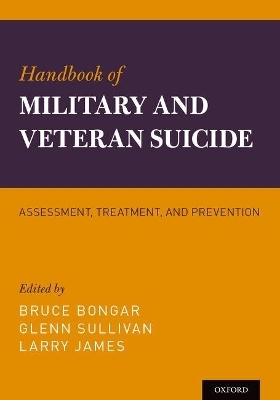
Handbook of Military and Veteran Suicide
Oxford University Press Inc (Verlag)
978-0-19-987361-6 (ISBN)
This comprehensive Handbook covers all relevant topics and current research in suicide in military and veteran populations, including links between suicide and PTSD, the stigma of mental health treatment in the military, screening for firearms access in military and veteran populations, "subintentioned" suicide (e.g. reckless driving and other such "accidental" deaths), women in combat, and working with families. Chapters also cover suicide risk assessment, ethical issues in treating suicidal patients, evidence-based treatments for PTSD, traumatic brain injury, and managing suicide in older veterans. Significant issues that may arise in assessing and treating military and veteran populations who are at risk for suicide are presented and discussed with evidence-based and practical recommendations. This Handbook will benefit researchers, policy makers, and clinicians who work with active duty military and veteran populations.
Bruce Bongar, PhD, ABPP, FAPM, CPsychol, CSci, is the Calvin Distinguished Professor of Psychology at Palo Alto University and served as Consulting Professor of Psychiatry and Behavioral Sciences at Stanford University's School of Medicine as well as Co-Chair and Director of Training for the PGSP-Stanford doctor of psychology program. For over three decades, Professor Bongar's research and published work has focused on the wide-ranging complexities of therapeutic interventions with difficult patients in general, and on suicide and life-threatening behaviors in particular. Glenn Sullivan, PhD, is an Associate Professor of Psychology at the Virginia Military Institute. In addition to his numerous publications and presentations, Dr. Sullivan maintains an active private practice in Lexington, Virginia. His clinical specializations include psychological assessment, forensic evaluation, and the treatment of combat veterans. Larry Charles James, PhD, ABPP, is the President and CEO of the Wright Behavioral Health Group, LLC, and is a Professor at Wright State University. Dr. James retired as a Colonel from the United States Army and served as the Chair of Psychology at both Walter Reed Army Medical Center and Tripler Army Medical Center. Colonel James was awarded both the Bronze Star and the Defense Superior Service Medal.
1. Introduction into Military Suicide
Elvin Sheykhani, Lori Holleran, Kasie Hummel, and Bruce Bongar
2. Why suicide?
Victoria Kendrick, Lori Holleran, David Hart, Dana Lockwood, Tracy Vargo, and Bruce Bongar
3. Suicide and the American military's experience in Iraq and Afghanistan
Joseph Tomlins, Whitney Bliss, Larry James, Bruce Bongar
4. Suicide in the Army National Guard: Findings, Interpretative Framework, and Implications for Intervention
James Griffith
5. Combat experience and the acquired capability for suicide
Craig J. Bryan, Tracy A. Clemans, and Ann Marie Hernandez
6. Combat-related killing and suicide through the Interpersonal-Psychological Theory of suicide
Lindsey L. Monteith and Shira Maguen
7. Suicide risk assessment with combat veterans - Part I: Contextual factors
Christoper G. AhnAllen, Abby Adler, and Phillip M. Kleespies
8. Suicide risk assessment with combat veterans - Part II: Assessment and Management
Phillip M. Kleespies, Abby Adler, and Christoper G. AhnAllen
9. Driving Themselves to Death: Covert and Subintentioned Suicide among Veterans
Glenn R. Sullivan, Phillip C. Kroke, Timothy Hostler
10. Identifying MMPI-2 risk factors for suicide
John J. Barreto and Roger L. Greene
11. Ethical Issues in the Treatment of Suicidal Military Personnel and Veterans
Brad Johnson and Gerry Koocher
12. Evidence-based treatments for the treatment of PTSD: Clinical considerations for PTSD and comorbid suicidality
Afsoon Eftekhari, Sara J. Landes, Katherine C. Bailey, Hana Shin, and Josef I. Ruzek
13. The Collaborative Assessment and Management of Suicidality (CAMS) with suicidal service members
David A. Jobes, Blaire C. Schembari, and Keith Jennings
14. Healing the hidden wounds of war: Treating the combat veteran with PTSD at risk for suicide
Herbert Hendin
15. Traumatic brain injury and suicide
Beeta Y. Homaifar, Melodi Billera, Sean M. Barnes, Nazanin Bahraini, and Lisa A. Brenner
16. U.S. Special Operations Preservation of the Task Force and Family Task Force
Bruce Bongar, Kathryn Maslowski, Catherine Hausman, Danielle Spangler, and Tracy Vargo
17. Managing Suicide in the Older Veteran
Bavna B. Vyas, Lisa M. Brown, David Dosa, and Diane L. Elmore
18. Person-centered prevention of suicide in primary care settings
Paul R. Duberstein, Marsha Wittink, and Wilfred R. Pigeon
19. Caring letters for military suicide prevention
David D. Luxton
| Erscheinungsdatum | 06.05.2017 |
|---|---|
| Verlagsort | New York |
| Sprache | englisch |
| Maße | 257 x 180 mm |
| Gewicht | 640 g |
| Themenwelt | Geisteswissenschaften ► Psychologie ► Arbeits- und Organisationspsychologie |
| Geisteswissenschaften ► Psychologie ► Klinische Psychologie | |
| Geisteswissenschaften ► Psychologie ► Sozialpsychologie | |
| Sozialwissenschaften ► Politik / Verwaltung | |
| ISBN-10 | 0-19-987361-5 / 0199873615 |
| ISBN-13 | 978-0-19-987361-6 / 9780199873616 |
| Zustand | Neuware |
| Haben Sie eine Frage zum Produkt? |
aus dem Bereich


